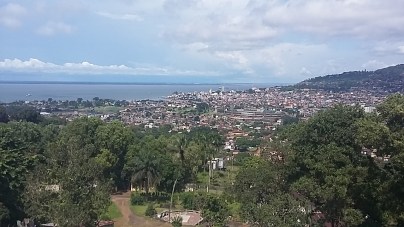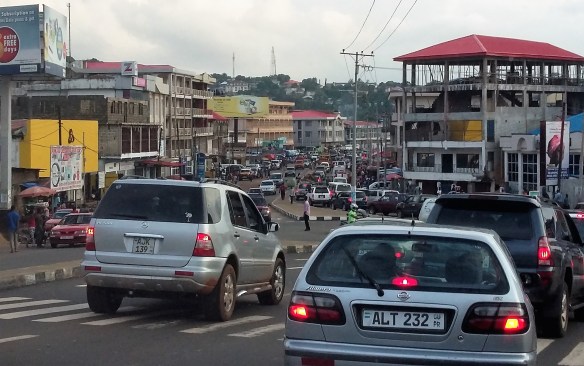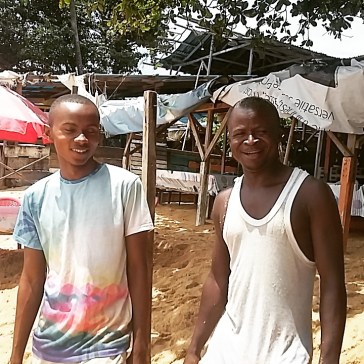I don’t suppose you ever completely know what you’re heading into when you move abroad but it’s fair to say we hadn’t the first idea.
As I look back to those first days in Sierra Leone, I struggle to remember how I kept the Flump entertained through those long days with only a few books and the odd toy, and nothing so much as an electric fan to temper the searing March heat

Keeping hydrated was our prime concern early on
It must go down as one of the most challenging times in my life. We had so few possessions, no reliable means of transport, uncertainty over the arrival of our freight and, unsurprisingly, doubts as to the wisdom our choice.
It was tough at the time but we just blamed ourselves for being a bit feeble. Besides, wasn’t it our own fault if we were ill-prepared?
Anyway, how could we complain when a short walk outside would reveal how tough life really could get?
Despite all that, we never wanted to go home. We’d embarked on this adventure for good reasons and we weren’t giving up that easily. And it was still fun. We could usually laugh about our troubles over a Star beer or a tea shared from our one viable drinking vessel.
It was only when a friend – a veteran of numerous foreign postings – told us “yeah, this is the hardest country [to live as an expat] in Africa” that we realised perhaps we weren’t being as soft as all that. My struggle to adjust wasn’t just the result of my being a giant wuss. Or, at least, not entirely.
It’s hard to explain why that is. Sierra Leone isn’t South Sudan, where civil war keeps you confined to a secure compound. Neither is it riven with ethnic or religious tensions, or a hotbed of violent crime, robberies or carjacking.
It’s just that getting any little thing done cam take an extraordinary amount of faffing about. In time, of course, things get easier. And when dealing with little setbacks, you try to keep smiling and remind yourself that you’re one of the lucky ones. Then one day you might just realise you’re actually enjoying the whole experience.
So, after a bit more than nine months, here’s my final word on expat life, Salone style:
Beauty and the beast
So much of life in Sierra Leone is about contradictions. Stand in the warm sea and gaze back at any of the Western Peninsular beaches – with their mountain jungle backdrop and sand of silver, white or golden yellow – and the beauty is undeniable.
Go on the wrong day, however, and the tide will send plastic water bags brushing against your legs, you’ll see bottles, cans and old shoes bobbing on the surface, and have to tread between broken glass on the shore.

Drive around Freetown and you’ll be rewarded with fine views
Freetown has the potential to be a truly great world city.
A natural habour hemmed in by lush mountains it offers spectacular views at practically every turn, provided they aren’t veiled by smoke from rubbish burning at the city dumps.
Atlantic rollers crash onto two miles of uninterrupted beach at Lumley, the perfect playground for locals and tourists.
But the place can be awash with rubbish, including medical waste. Contractors are cleaning up more regularly these days. But there appears little thought behind the development around the beach, with ever-more characterless private villas and ugly restaurants.
Life and laundry
I only met one foreigner who didn’t describe the first month in the country as a “nightmare”, or something similar.
Finding a place to live, and a way to get your hands on enough cash to pay a year’s rent upfront, are headaches quickly followed by puzzles over buying a car, finding good daycare or whatever else you need to make life work. But once you’ve employed as much home help as you’re comfortable with (our laundry lady was probably our soundest investment), your body adjusts to the climate and you meet friends who offer good advice, life finally settles into a routine.

Driving in Freetown: Often frustrating, always fascinating
You also get used to the little complications – queuing for electricity top-up, shopping in three (expensive) supermarkets to find everything you want, buying yet more oil for the generator – or else pay someone else to worry about them. You stop noticing the hassle, until the day you arrive home and realise how much easier everything is.
And for someone who’s flown straight in from London, this place is just so fascinating – like living in a permanent adventure holiday. I loved seeing the bustle around marketplaces, looking in stalls that reminded me of the long-gone chandler’s shop I remember from childhood and grabbing my lunch from the top of a vendor’s head.
Even the driving is fun, whether bumping along pitted hillside tracks, negotiating the chaotic roundabouts or listening to almighty rows between drivers that never quite seemed to come to blows. Head upline from Freetown to rural villages, many with specialities like basket-weaving or honey production, and you feast your eyes on the rice and colourful chilis drying on the hot asphalt.
Atmosphere, attitudes and ‘advantages’
Probably the most important thing about any place you call home is how it makes you feel. There’s no doubting that Sierra Leone is a nice place to be and a lot of that is thanks to its friendly folk.

When blokes with smiles like this demand you take their photo, how can you refuse?
Initially I wasn’t so sure. Unused to being an oddity, I mistook people’s unsmiling stares and (particularly in those of lower social standing) natural diffidence for hostility. However, a short walk up the road set me straight as countless people would stop for a chat – particularly if I had the Flump in tow.
If your car breaks down or you’re struggling to park, then help is usually at hand and offered readily, probably in the hope – but not necessarily expectation – of financial reward.
Practically everyone in Sierra Leone will tell you how you can’t trust anyone, that theft is rife and that people are always “taking advantages”. Sure, we were routinely overcharged by some traders, such as fruit vendors, but others were dead straight – and would even throw in an extra banana for the Flump. Poda-poda drivers would insist on returning Le500 change.
In fact, Freetown feels safer to walk around at night than most places I’ve lived in Britain. I was more worried about falling down a hole than getting mugged. (Missing drain covers make that an all-too-real possibility.) There are targeted robberies but they seem to be a rarity. And in our time there, we had nothing stolen.
Indeed, we happily doled out Flumpo’s books to the local kids, and they always came back. Likewise, her local beach buddies would not only keep her entertained but wash the sand off her toys in the sea before returning them with thanks.
Work and WiFi
As a place to do business, Sierra Leone can leave you banging your head against a wall. For a homeworker, finding decent WiFi is a problem. Installing it at home costs a fortune, while accessing it in hotels or restaurants comes with an obligation to buy expensive coffee or cakes – and you can’t always guarantee a good connection.
![20160515_115101[1]](https://expatfamilyfortunes.com/wp-content/uploads/2016/05/20160515_1151011.jpg?w=364&h=607)
One thing I won’t miss: Sierra Leonean plumbing
However, many expats are frustrated by over-complicated or downright nonsensical workplace practices.
Others complain of an absence of initiative, perhaps due to a lack of critical thinking in the classroom (though I’m no expert), while civil war and Ebola have caused skills shortages.
This is also an area where corruption rears its ugly head. Anecdotally, working with any public body seems to involve greasing the palms of officials to get what you’re entitled to or – if you have dubious ethics – more than you’re entitled to.
How absurd that charities, supported by ministers but unwilling to pay bribes, are made to wait for goods they deserve by Customs officials, or else simply avoid the hassle by importing through foreign ports and transport them across land borders.
Tradesmen use ingenious ways to get around a lack of spare parts: I’ve seem plumbers repair water pipes with bicycle inner tubes, while a mechanic fixed my car with the aid of a carrier bag he picked up off the road. Sadly, not all are so competent. One plumber somehow managed to cut off the water supply from our emergency tank, while a carpenter who tried to repair a door clearly hadn’t the first idea how to use filler.
Locals explain away anything in life that’s crap or pointless with a shrug and the simple observation: “This is Africa.” I quickly came to hate this phrase, even if it was partly said in jest. If you don’t challenge the status quo, things will never get better. Worse still, put yourself down often enough and you’ll start to believe it.
Health and happiness
As I wrote before we flew to Freetown, our main concern was keeping the Flump healthy. Thankfully, when she actually was diagnosed with malaria, she was flown home for treatment without delay or question. So while we’d rather our prior reasoning hadn’t been tested, the process went exactly as it should have done.

Few Sierra Leoneans enjoy access to such a well-equipped private clinic
I did live in fear of her getting a nasty bump on the head. Insurance gave us access to a swanky private clinic but while the paediatrician was excellent, forgetfulness and a lack of urgency gave us cause to have less confidence in some of the nurses. Meanwhile, medically qualified friends warned us to check dosages in doctors’ prescriptions against NHS guidelines.
While the One With The Common Sense stayed healthy throughout, barring the odd case of Mano River Rotgut, both the Flump and I picked up more persistent intestinal adventurers. There’s no doubting that even such minor ailments can get you down over time, though they should be easily treatable.
But on the whole, was it a happy and healthy experience? Definitely. Put simply, Sierra Leone is a nice place to be; attractive, friendly and fun.
If you eat a local diet, then in season there’s an abundance of tasty fresh fruit to supplement the staples of fish, rice and fiery greens. The climate takes a bit of getting used to but Freetown’s location always means there’s welcome relief at the beach.
If you end up driving everywhere, you’ll want to find a way of exercising – either at membership organisations like the YSC or Aqua Sports Club – or with an exhilarating beachfront run. As a runner, the heat and humidity proved a barrier. Early mornings worked best; in the evenings the sun sets frustratingly early (around 7pm year-round), and it’s extremely hazardous after dark.
So, a good move?
We enjoyed the vast majority of our time in Sierra Leone. The periods when we first started to feel settled and after returning from our summer break, as we got more adventurous and our social lives expanded, were particularly happy ones. We would certainly have been perfectly content if we’d stayed a while longer.
However, content is probably as far as it goes. Beyond visiting more places in the interior – not always easy with a toddler – it was difficult to see how much more interesting life would get. The beaches are fantastic – the Flump loved them – but we were beginning to feel frustrated at the lack of variety in our weekend routine. We had a good circle of friends, but you’re always waiting for the next ones to leave. As it turned out, that was us.
We both agree we would certainly have got more out of Freetown had we been single, or at least without child, but then the same applies at home in many respects. But it was a perfectly fine place for a family like ours and we didn’t have many more day-to-day worries than we do in the UK.

Following the long road home from central Freetown
Heading to Sierra Leone undoubtedly worked for us. The One With The Common Sense achieved an ambition to get experience of working in a developing country, and that undoubtedly helped her secure her next role.
I’ve been incredibly lucky. Not only did I get the chance to spend the best part of a year writing (well, when I wasn’t doing the chores), but also the One With The Common Sense has always viewed this unpaid work as legitimate career development – a luxury not all writers are afforded.
As for the Flump, our early departure means she’ll remember little if anything about her African adventure. All I can say is that she was a happy little girl who felt a lot of love while she was there.
The nicest outcome is that moving to Sierra Leone has brought about a situation we’d talked about for years; moving to Liverpool. Going to my hometown in search of adventure might seem like an odd choice. But the city has changed immensely in 20 years and I can’t wait to start exploring it in earnest.
It’s as though travelling those thousands of miles to another continent and culture has in a roundabout way brought us to a place we’ll properly call home.
For a while, at least.

Thoroughly enjoyed your African adventures but now looking forward to hearing about Liverpool about which I know very little apart from The Beatles and Football (courtesy of my son).
Becky
LikeLike
He’s been telling you how great Everton are, I trust?
LikeLike
Wonderful Andy. You make a chap interested going back for another look. Perhaps, but maybe not just yet.
LikeLike
Great blog!! Plumbing maze pic is spot on:)!
When you next come please stop by the Shookoobly business centre at hill station to work in a conducive office setting. It offers anything from hourly hot desks with wifi inclusive to short/long term all inclusive office rentals and meeting/ conference rooms – all in a scenic garden setting info@shookoobly.com +232 78 88 85 85.
LikeLike
Another immensely readable blog Andy. If your book’s as engaging then it’ll be a hit. Plus love the photo of the Flump with two little friends.
LikeLike
Cheers Oran – and thanks for being a long-time supporter of the blog.
LikeLiked by 1 person
Always nice to read an outsider’s perspective of my city. It is like seeing the place through someone else’s eyes. You certainly experienced many facets of life in the city, right down to the le500 change on the poda poda ride. A very interesting read. Outsider’s perspectives will help us improve on our city. Thanks for coming. I have a feeling you will be back.
LikeLike
Thanks Christopher. I hope I will be!
LikeLike